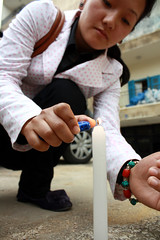Published on Hibr in May 2011.
A large banner bearing a death announcement fluttered in the wind last Sunday beside an apartment in Jdeideh as some thirty people gathered nearby holding candles to commemorate the death of a young woman in circumstances hard to comprehend, yet disturbingly far too common in Lebanon these days.
The mood at the vigil was a mix of grief and anger, as mourners held posters calling for “public and transparent investigation” of her death and of the deaths of other migrant workers who have died in Lebanon while observing a minute of silence to remember the life of Samoay Wanching Tamang, a young Nepalese migrant worker who had died in the Jdeideh apartment building.
Unfortunately, the authorities’ flippant handling of Samoay’s case and Lebanese society’s indifference to the plight of migrant workers suggests that the chances of her case being given a thorough investigation are slim.
Pushed to Suicide?
On February 26, 30-year-old Samoay was found dead and hanging from a “metal bar in the bedroom of her employer,” as the blurb in Lebanon Files reported (and as Hibr reported at the time). The police noted the case and deemed it a “suicide” based on physical evidence at the death scene. The scene, however, only answers so much.
Lebanese activists soon picked up the case and launched an independent investigation. Their investigation revealed that Samoay had a four year old daughter in Nepal who was seriously ill with a long-term illness who depended on medication to survive. The money Samoay sent back every month was this child’s only source of funding for the life-saving treatment.
Farah Salka was one of the activists who took on the case. As she began to probe the details, all sorts of questions ignored in the police report began to emerge. “Why did she kill herself if that her only source of funding? Maybe because she wasn’t getting her salary on a monthly basis and thereby felt helpless at the situation of her daughter?” Unfortunately, despite activists’ efforts, police and the employer’s unwillingness to cooperate in conducting a serious investigation mean the details of Samoay’s death will most likely remain forever shrouded in mystery.
“Five migrant workers dead this month”
The tragic story of Samoay’s death is not by any means an exception. Every week in Lebanon, an average of one migrant worker is found dead, according to a Human Rights Watch in 2009, the latest year for which data is available. As of the date of publishing, at least 5 migrant workers have died this month, according to sources tracking the deaths at Migrant Worker Task Force.
All of these deaths have been treated cursorily by the Lebanese police, and in at least one case there is strong evidence to suggest that police violence is the actual cause of death. Despite this, there will be no punishment, and there will be no headlines demanding justice for these migrant workers’ deaths. But, if some activists have their way, there will be fury, and there will be shaming.
“It is like some dog…died in the street”
Salka, a member of Anti-Racism Movement and the Migrant Worker Task Force, which helped organize the vigil, commented that, “The situation with migrant domestic workers and racism as a whole in this country has reached horrendous levels. And until the day comes when enough people and voices are shouting against that, it shall continue as such.”
Priya Subedi, an active member of the Lebanese chapter of the Non-Resident Nepalese Association and one of the independent investigators on the case concurred. “Every time migrant workers die here, it is ignored. It is like some dog or something died in the street. I feel that at least she [Samoay[ was lucky that everyone went there and we prayed for her.”

“We will hold accountable the authorities and murderers”
On Sunday afternoon, Samoay’s former neighbors looked down on to the vigil with varied reactions. Some residents of the apartment building looked down solemnly, while others laughed and joked around as the crowd below mourned a young woman and a lost friend. One migrant worker, a Nepalese woman and friend of some of the mourners, took note of the vigil from her balcony and tried to communicate with them. When her madame noticed the vigil, however, she came out, forced the young woman to come back inside, and shut the curtain closed.
The grief of the vigil contrasted with rage at a post-vigil meeting held at a Nepalese restaurant in Dora. As the smell of momos and Nepalese curry wafted through the crowded café’s air, mourners debated the future of migrant workers in Lebanese society. In the face of public indifference and police negligence at the violence and racism, the future they agreed, was in the hands of activists.
Mirna Haidar, a members of Anti-Racism Movement, said “We will not be satisfied until employer’s treat their workers like human beings, and those who abuse them live in fear. We will blow the whistle… and we will not be silenced on murders, violence, and racism.”
She continued, “Samoays vigil is only the beginning of honoring who died, were killed, [or] suicided under very harsh circumstances. We will hold accountable the authorities and murderers.”